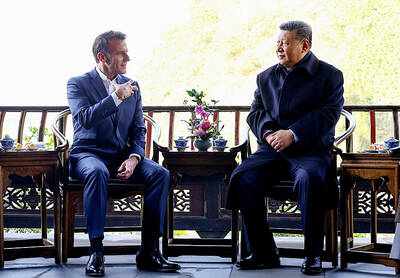The struggle to entice US Army soldiers and Marines to stay in the military, after four years of war in Iraq has ballooned into a US$1 billion campaign with bonuses soaring nearly sixfold since 2003.
The size and number of bonuses have grown as officials scrambled to meet the steady demand for troops on the battlefields in Iraq and Afghanistan and reverse sporadic shortfalls in the number of National Guard and Reserve soldiers willing to sign on for multiple tours.
Besides underscoring the extraordinary steps the Pentagon must take to maintain fighting forces, the rise in costs for re-enlistment incentives is putting strains on the defense budget, already strapped by the massive costs of waging war and equipping and caring for a modern military.
bonuses
The bonuses can range from a few thousand dollars to as much as US$150,000 for very senior special forces soldiers who re-enlist for six years. All told, the Army and Marines spent US$1.03 billion for re-enlistment payments last year, compared with US$174 million in 2003, the year the war in Iraq began.
The Associated Press compiled and analyzed the budget figures from the military services for this story.
"War is expensive," said Colonel Mike Jones, who oversees retention issues for the National Guard. "Winning a war, however, is less expensive than losing one."
Soaring budgets for re-enlistment bonuses -- particularly for the Guard and Reserves, which have seen the most dramatic cost increases -- has prompted some observers to question whether the country can still afford its volunteer force.
"I believe the whole issue of the affordability of the volunteer force is something we need to look at," said Arnold Punaro, who heads an independent panel established by Congress to study the National Guard and Reserves.
The higher bonuses come as support for the war continues to wane both in Congress and with the American public.
That decline is fueling concerns that more soldiers will leave the military under pressure from families who fear the rising death toll and are weary of the lengthy and repeated overseas deployments. The Iraq war has claimed the lives of at least 3,280 US troops to date.
Incentives for Army Guard and Reserve members combined have skyrocketed from about US$27 million in 2003 to more than US$335 million last year.
The active Army, meanwhile, poured more than US$600 million into these payments last year, a sixfold increase from US$98 million in 2003. The Army gave two out of every three soldiers who re-enlisted a bonus last year, compared with less than two in 10 who received one during 2003.
left out
Those who do not get bonuses are generally in jobs that are not in high demand or are not in war zones.
For example, certain artillery crewmembers who re-enlisted outside Afghanistan or Iraq would receive no bonus, Army spokesman Lieutenant Colonel Bryan Hilferty said.
Bonuses for Marines have nearly doubled, from about US$50 million in 2003 to nearly US$90 million last year.
The incentives help the military compete with private employers who often pay much higher salaries, Hilferty said.
"Soldiers with valuable skills and experience are aggressively sought after by industry," he said.
He said while the extra money is important as "people don't re-enlist in a wartime Army for US$13,000 ... If soldiers didn't think they were doing the right thing for the right reason, they would get out and get a job back home."
He said soldiers with special skills can get bonuses between US$10,000 and US$30,000, with a select few eligible for payments up to US$50,000.

PARLIAMENT CHAOS: Police forcibly removed Brazilian Deputy Glauber Braga after he called the legislation part of a ‘coup offensive’ and occupied the speaker’s chair Brazil’s lower house of Congress early yesterday approved a bill that could slash former Brazilian president Jair Bolsonaro’s prison sentence for plotting a coup, after efforts by a lawmaker to disrupt the proceedings sparked chaos in parliament. Bolsonaro has been serving a 27-year term since last month after his conviction for a scheme to stop Brazilian President Luiz Inacio Lula da Silva from taking office after the 2022 election. Lawmakers had been discussing a bill that would significantly reduce sentences for several crimes, including attempting a coup d’etat — opening up the prospect that Bolsonaro, 70, could have his sentence cut to

A plan by Switzerland’s right-wing People’s Party to cap the population at 10 million has the backing of almost half the country, according to a poll before an expected vote next year. The party, which has long campaigned against immigration, argues that too-fast population growth is overwhelming housing, transport and public services. The level of support comes despite the government urging voters to reject it, warning that strict curbs would damage the economy and prosperity, as Swiss companies depend on foreign workers. The poll by newspaper group Tamedia/20 Minuten and released yesterday showed that 48 percent of the population plan to vote

A powerful magnitude 7.6 earthquake shook Japan’s northeast region late on Monday, prompting tsunami warnings and orders for residents to evacuate. A tsunami as high as three metres (10 feet) could hit Japan’s northeastern coast after an earthquake with an estimated magnitude of 7.6 occurred offshore at 11:15 p.m. (1415 GMT), the Japan Meteorological Agency (JMA) said. Tsunami warnings were issued for the prefectures of Hokkaido, Aomori and Iwate, and a tsunami of 40cm had been observed at Aomori’s Mutsu Ogawara and Hokkaido’s Urakawa ports before midnight, JMA said. The epicentre of the quake was 80 km (50 miles) off the coast of

RELAXED: After talks on Ukraine and trade, the French president met with students while his wife visited pandas, after the pair parted ways with their Chinese counterparts French President Emmanuel Macron concluded his fourth state visit to China yesterday in Chengdu, striking a more relaxed note after tough discussions on Ukraine and trade with Chinese President Xi Jinping (習近平) a day earlier. Far from the imposing Great Hall of the People in Beijing where the two leaders held talks, Xi and China’s first lady, Peng Liyuan (彭麗媛), showed Macron and his wife Brigitte around the centuries-old Dujiangyan Dam, a World Heritage Site set against the mountainous landscape of Sichuan Province. Macron was told through an interpreter about the ancient irrigation system, which dates back to the third century